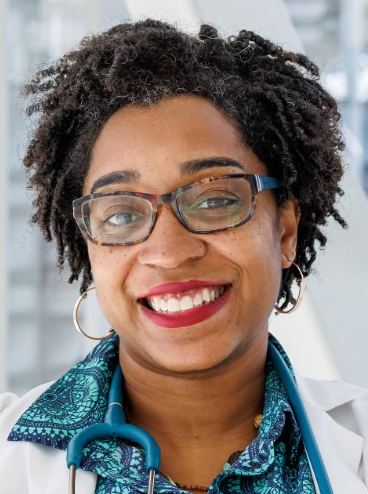
October 2024
HIV and advanced HIV (formally known as AIDS) remains a critical public health issue, particularly among adolescents aged 13 to 24, who account for a significant proportion of new infections in the United States. Despite advancements in treatment and prevention, stigma and a lack of comprehensive sexual health education contribute to persistent disparities.
Samantha Hill’s research focuses on improving sexual health knowledge and HIV prevention strategies among adolescents, particularly focusing on Black youth in the Southern United States. Her research is inspired by the youth she cares for in adolescent and HIV clinics. Dr. Hill’s research employs a mixed-methods approach, combining qualitative and quantitative methods such as interviews and discrete choice experiments to develop interventions and relies heavily on community-engagement and informed methods. Dr. Hill was awarded a K23 from the National Institutes of Mental Health so she can focus on increasing sexual health and HIV prevention knowledge among teenagers. The last part of this study involves refining an app called “HealthMpowerment” so she can improve sexual health knowledge and behaviors among Atlanta youth and Alabama youth (where she first started this research). She also aims to refine the app to facilitate communication between youth in Atlanta and Alabama with adult support persons (e.g parents, older siblings, mentors). Her hope is that this app can bridge knowledge gaps between young people and their adult support systems while addressing the significant burden of sexually transmitted infections (STIs) and HIV in this demographic.
While the research is ongoing, initial findings highlight several key areas of concern:
- Knowledge Gaps: Many adults reported feeling inadequately prepared to discuss sexual health topics, underscoring the need for targeted educational resources.
- Communication Barriers: There exists a significant disconnect between the knowledge held by young people and that of their adult supporters, which can hinder open discussions about sexual health.
- Interest in Technology: Youth and adult support participants expressed a strong interest in utilizing mobile applications as a means of accessing information and support.
This research highlights the critical role of community engagement in addressing the sexual health needs of adolescents. By fostering collaboration between young people and their adult supporters, the study aims to promote healthier relationships, reduce the incidence of STIs and HIV, and ultimately empower youth to make informed decisions about their sexual health.
Dr. Hill says she didn’t always know this was going to be her career path. She says it wasn’t until she interviewed for faculty positions that she started considering a career in research. “It's never too late to pivot, whether pivoting into research or into something else,” says Dr. Hill. “It's been a blast for me to be able to do this work.”

